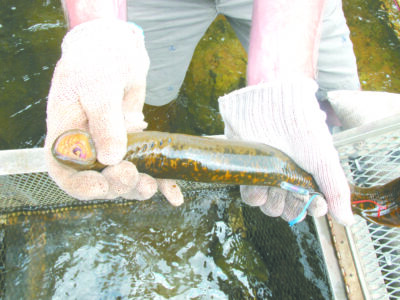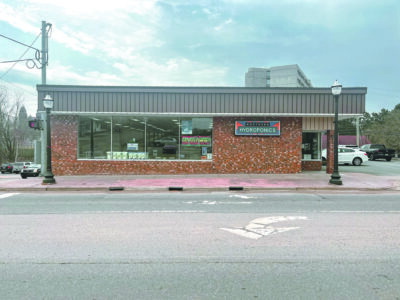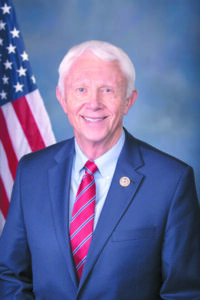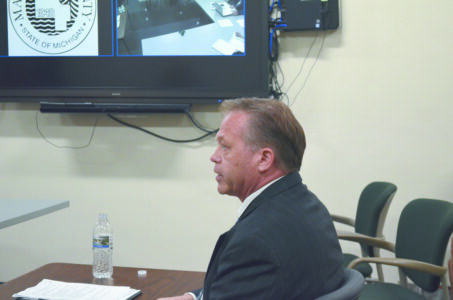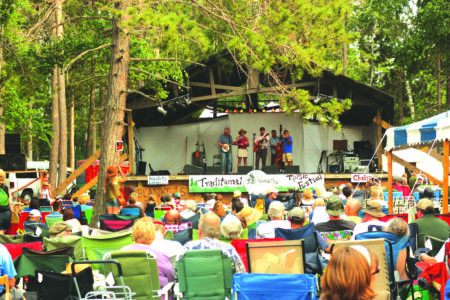Searching for recovery in the U.P.
Annual run highlights sobriety resources; personal stories, data suggest ‘normalization’ of binge drinking in region

From left, Brooke Tharp, foundation assistant for Great Lakes Recovery Centers, assists sisters Lily and Sophie Delongchamp of Negaunee in registering for the GLRC’s Run for Recovery on Wednesday night. Lily and Sophie Delongchamp both attended in support of loved ones in recovery. (Journal photo by Shannon Konoske)
MARQUETTE — Over a fifth of Marquette County residents report alcohol consumption rates that can be defined as excessive drinking by health professionals, statistics show.
These numbers become a timely concern in a season dominated by alcohol-centric holidays and festivals. Yet, at the same time, local people and organizations are working to raise awareness, funds — and hope — for addiction treatment and recovery in the central Upper Peninsula.
The 14th annual Great Lakes Recovery Centers’ Run for Recovery began Monday as a mostly virtual event, with one in-person event for Marquette on Wednesday night, beginning at Sue B’s Recovery House on Wright Street.
If people missed out, they may still “walk, run, hop, skip, or even bike any distance … anywhere,” through Sunday as the website says — but must register by 11:59 p.m. Sunday on the website to receive a T-shirt.
The occurrence of addiction-focused fundraising — the proceeds of which fund safe housing for those continuing to recover from the impacts of addiction — amidst festivities which center around binge drinking begs a closer look at alcohol use and abuse in the central Upper Peninsula and the cultural norms that contribute to a social acceptance of binge and heavy drinking.
Elissa Kent — who is currently an instructor at Northern Michigan University and is a licensed master’s social worker, a certified advanced addiction and drug counselor, and a certified clinical supervisor — has had a number of roles that informed her knowledge of the influence that the Upper Peninsula’s culture and social norms can have on drinking behavior. These roles include a decade’s worth of experience with various professional positions in treating substance use disorders in the U.P., including jobs as a counselor, case manager, program supervisor, director of residential services and operations director.
“I spent a lot of time working with individuals struggling to navigate the complexities of their substance use disorder in the context of the drinking culture of the Upper Peninsula,” Kent said. “Many people struggled to let go of alcohol because it’s so socially acceptable in our culture and them choosing to abstain would be isolating for them.”
But how is a substance use problem defined when it comes to alcohol?
Binge drinking is defined by the Michigan Department of Health and Human Services as consuming five or more alcoholic drinks per occasion — for men — and four or more alcoholic beverages per occasion — for women — at least once in the past month.
Heavy drinking is defined as consuming an average of more than two alcoholic beverages per day for men and more than one alcoholic drink per day for women in the past month.
Some area residents may be surprised when they hear these definitions, as having a couple of drinks each night after work is a normalized ritual for many people.
However, national statistics and other information demonstrates why and how this habit might escape the definition of “excess” for many here, as both the state and county statistics for heavy drinking surpass other states and Michigan counties.
For example, Michigan ranked 10th in a 2018 listing of the nation’s “drunkest states” — which was based on reported binge and heavy drinking — by USA Today, with 20% of adults reporting excessive drinking, exceeding the national average of 18%.
Marquette County further exceeded the state and national averages with 21.8% of adults reporting excessive drinking, ranking No. 7 of Michigan’s 83 counties. And the number of people who engaged in excessive drinking is expected to have risen during the COVID-19 pandemic, according to MLive’s 2019 ranking of the most excessive drinkers by county.
For example, the Metro Times reported that Michigan adults consumed, on average, 18 alcoholic drinks per week during 2020, according to a survey conducted by drugabuse.com. Likely in response to the pandemic, these figures exceeded the U.S. Centers for Disease Control and Prevention’s definition of heavy drinking for men and women.
The isolation that non-drinkers might feel in the U.P. becomes easier to understand when examining drinking behavior against the social backdrop of the region.
“Drinking is a very large part of U.P. culture,” Kent said. “Very rarely do you encounter people who do not drink regularly, and as such, it permeates nearly all social events and gatherings.”
And while this may seem like an anecdotal observation, research supports this, as well as Kent’s experience observing alcohol consumption patterns in other regions.
“In comparison with other places I’ve lived, drinking and binge drinking specifically are a much larger piece of the culture. It is almost expected that people drink during events and gatherings, and people are questioned when they do not drink and even pressured to drink,” Kent said. “In other places, it does not come with such enormous social pressures.”
Such comparisons offer a more complex and informative lens than the numbers alone can provide. Kristen Cody, for example, is originally from Southern California. She moved to Marquette in 2018 to attend the masters of arts in English program at Northern Michigan University and is now a permanent resident of Marquette.
“I’m from Southern California, and I’m also from a drinking city,” Cody said. “Newport Beach is like a party town. There’s a bunch of bars — there’s a peninsula, the Balboa Peninsula — so it’s like a party strip. I’ve done a lot of Uber driving. One of the people there had said they spent $10,000 a year on Lyfts and Ubers because they’d gotten two (driving under the influence citations), so they have the money to get the help … Up here, people don’t have the money to do Lyft and Uber and there aren’t any (rideshare services).”
What Cody begins to point to in her comments on drinking in the U.P. is not just the cultural norms surrounding drinking culture, but the attitudes, behaviors and circumstances surrounding drunk driving in the region.
In addition to the numbers for reported binge and heavy drinking among Michigan adults, operating while intoxicated arrests and alcohol-related accidents have been steadily increasing in the past three years.
For example, the number of alcohol-related crashes in the U.P. rose from 303 in 2018, to 313 in 2019 and 344 in 2020, with 8, 15 and 12 of those resulting in a fatality, respectively, according to michigantrafficfacts.org.
To Kent and Cody, driving while intoxicated in the U.P. has struck them as a common behavior, one they both chalked up to a combination of circumstance and social behaviors.
“It seems that in the U.P., driving while/after drinking is a cultural norm. I think the rurality of the U.P. lends itself to people thinking that it’s ‘safer’ to be drinking and driving,” Kent said. “I’ve also heard many people here say they are better drivers while they are drinking.”
Cody echoed an observation of rurality’s effect on the perception of drunk driving and a lack of resources like Uber and Lyft. However, she also noticed that there is a more relaxed attitude about the practice in the area.
“I won’t say the name of the bar,” Cody said, “but we were kind of celebrating. I’m a one-to-two drinker socially. It’s not an everyday thing for me … the people I was with were going a little bit more than me, and I wasn’t driving so I was like, ‘I guess I’ll have a third.’ And the person (serving) at that particular establishment was like, ‘Well even if you were driving, everywhere is like five or 10 minutes away — you’ll be fine.’ Just a very relaxed view on drinking and driving.”
In addition, Cody mentioned that she had heard that some people “go on ‘booze cruises'” — a term for driving around while drinking and/or being intoxicated — as a form of entertainment.
In terms of alcohol-related deaths in general — those related to traffic accidents and many more that are not –Michigan is eighth highest among all 50 states and 17th highest in age-adjusted alcohol-attributable deaths per 100,000-population. These numbers, from the CDC’s most recent study, were enough to spark the Michigan Liquor Control Commission to urge moderation as a michigan.gov article reported in August 2020.
While alcohol-related deaths and traffic accidents are certainly red flags pointing to a potential cultural normalization of alcohol abuse, Cody believes that the area’s heavy drinking may point to another issue faced by U.P. residents.
Cody said, “I think it’s definitely a cultural thing here … (but) I also think there’s a lack of mental health resources up here — and there’s not just seasonal depression, there’s regular depression — and I think people use it as a coping mechanism.”
Amidst all of these cultural, social and circumstantial pressures which may contribute to excessive alcohol use in the U.P. — and normalize it — recovery seems like an exceptionally difficult prospect. Kent agrees.
“To be successful in helping people find recovery, it’s imperative for people to have healthy support systems, opportunities and communities to return to, and this can be incredibly difficult when the cultural norms have binge drinking and intoxicated driving interwoven into them,” she said.
Knowing this, the annual Run for Recovery then seems to serve those seeking recovery from addiction in two ways: first, by raising funds to support safe, healthy, sober environments to house those whom are attempting to integrate back into the community after treatment, and second, by providing a social event at which participants may gather without the pressure or expectation of drinking or substance use.
The Run for Recovery event assists in providing these safe environments for people throughout the U.P., as all proceeds from the event — hosted virtually through Sunday and at physical locations in Marquette, Sault Ste. Marie and L’Anse — will go toward GLRC’s recovery housing, said Tayler Tankersley, marketing coordinator for Great Lakes Recovery Centers.
“This type of specialty housing provides structure and support for those living in recovery and offers a safe environment for individuals to continue to heal from the impacts of substance abuse … (T)he impact that recovery housing provides is critical,” Tankersley said.
According to Tankersley, there are currently four recovery houses operated by GLRC in the U.P.: two recovery residences for women in Marquette and L’Anse — and two houses for men in Marquette and Sault Ste. Marie.
In addition to the monetary support these events provide for the centers, Tankersley said they also kick start important conversations that are integral to altering social stigmas, behaviors and norms.
“The Run for Recovery is not only a fundraising event, but also an awareness-raising event,” Tankersley said. “Throughout the week of the event, we are highlighting the importance of recovery housing and shedding light on the services that are available…. There tends to be a stigma associated with mental health and substance abuse that creates a barrier for people who are trying to access services.”
One major goal for Great Lakes Recovery Centers, Tankersley said, is to work on minimizing the stigma that plagues behavioral health issues by educating the community, collaborating with various agencies, and offering “a continuum of care to support individuals through their journey of recovery.”
As for this year’s events, Tankerley said, “I’m hoping to see a high … participation for this year’s Run for Recovery. It’s a great way to show support for mental health and substance abuse services…. I would love to see people engaging in conversations … and opening that line of discussion with friends and loved ones.”
Overall, these events provide support in numerous ways and raise awareness of mental health and substance abuse, such as alcohol abuse, specifically.
However, in conjunction with raising awareness, it’s key for residents to understand the social and cultural influences that take part in shaping what is normal for a community. In addition, those who are seeking recovery resources for themselves or someone else should know that there are agencies and individuals in the region who are ready to help.
Shannon Konoske can be reached at 906-228-2500, ext. 206. Her email address is skonoske@miningjournal.net.

